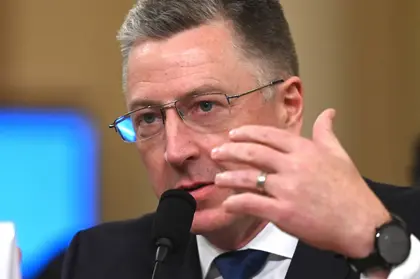NATO should have admitted Ukraine years ago, its former US Ambassador said.
Kurt Volker, former US Ambassador to NATO and American University co-founder and supervisory board member, gave a recent question and answer session with the press corps in Ukraine’s capital and outlined his views on Ukraine’s future related to membership in the alliance.
JOIN US ON TELEGRAM
Follow our coverage of the war on the @Kyivpost_official.
Asked by Kyiv Post whether the US and NATO had “dropped the ball” during earlier opportunities, especially after Russia’s 2014 invasion, to both ask Ukraine to join the alliance and to be equipped and trained in the F-16, Volker replied:
- Read the most current war in ukraine update from the Kyiv Post's daily news updates today.
- Get the newest Ukraine news reports as of today.
“I think using the phrase ‘dropped the ball’ is a little bit of a euphemism. We deliberately, from 2014 to 2017, imposed an arms embargo on Ukraine, denying any kind of link. No military support [after Russia’s initial 2014 invasion]. That was US policy and a huge mistake.”
“We should have started a program of training and equipping Ukraine in a proper way right from the start. We should have seen this,” he said at the Thursday, Sept. 7 session.
“Fortunately, in 2017, we lifted this ban, we got the Javelins [anti-tank weapons] and that opened the doors to other types of lethal assistance, which were essential. And I think, thank goodness, we did that because in 2022, that gave us a chance to stand [against Russia’s full-scale invasion].”

‘A National Embarrassment’ – Trump Pardons 1,500 Rioters Who Stormed US Capitol
“I don’t think NATO realizes it needs Ukraine yet, but they’re getting there.”
Asked about Ukraine’s path to NATO membership, Volker, while acknowledging it as a “hotly debated topic,” was adamant in saying NATO needs Ukraine:
“I know, among the media, the chattering class in Washington, all the ‘international security experts,’” the topic is debated repeatedly.
“The first thing I would say is I don’t think NATO realizes it needs Ukraine yet,” Volker said.
“But they’re getting there. Vilnius was a big step forward from where we were; it was a big step forward in terms of NATO’s understanding of what this conflict means.”
He then hit on the threat Russia is posing not just for Ukraine but for all Western democracies.
“My view is that [Russian President] Vladimir Putin has now shown an utter disregard for the European security framework that has existed since World War II,” he said.
“He’s trying to reestablish the Russian empire, extinguish the people in Europe, the Ukrainians, and threaten the rest of Europe including countries that have been part of the Russian empire, such as Estonia and Georgia.”
“ I don’t believe that NATO can do its job without Ukraine.”
Volker said future security hinges on Ukraine being part of the alliance to ensure the safety and defense of its current member countries.
“NATO’s job is the security and defense of its members and to deter attacks against those members, so we don’t have to fight,” he said.
“I don’t believe that NATO can do its job without Ukraine. Because from what we’ve seen if that happens, Putin wins.”
Volker also indicated that the military aid amounts cited are not direct cash payments but the estimated value of unused surplus weapons with expiring shelf lives, along with technical training, education and other services.
“We are not giving cash to Ukraine; we are adding up the value of the military support that we are providing to Ukraine,” he said. “This is equipment and technicians, training, whatever it is, we add up that value, and that’s the dollar amount that we quote. It’s essential services we are providing to Ukraine.”
Based on the form of aid given to Ukraine, he dismissed concerns about corruption sometimes cited by Western critics, saying “the opportunity for corruption in this market is extremely low compared to just giving money. So, there should be a lot more reassurance to the American people.”
Volker also addressed the NATO Article 5 issue, saying there should be no barrier for Ukraine to join the alliance if one reads the actual charter.
Speaking of the critics, he said, “The other thing they worry about is how do you deal with the situation of a country that doesn’t control all its own territory? So, you bring them in today and they have an Article 5 security guarantee.
Volker said not admitting Ukraine gives “an incentive for Russia to keep up the war, keep fighting [perpetually]. We don’t want to create that incentive.”
He said everyone should “get out the actual NATO treaty and read it.
“And I say this seriously... Just a couple of pages. Each article is only three or four sentences. Article 5 is the key operative article for collective defense.”
Volker said the treaty allows each nation to participate in the mutual defense pact in the way it finds suitable, not necessarily responding with military force.
“All it says is that in the event of an attack against one member, all your allies will respond in some way and then we all will be able to discuss what that response is.”
You can also highlight the text and press Ctrl + Enter










